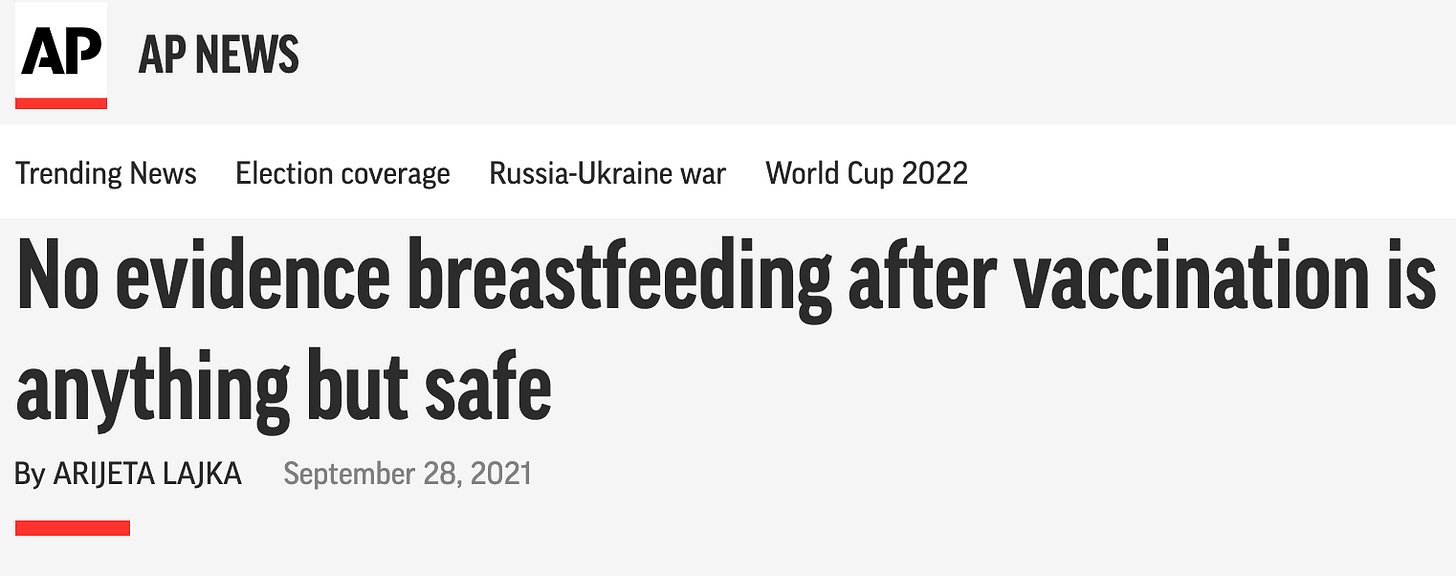The Most Dangerous Purveyors of Misinformation: The CDC, FDA, and White House
So Why Point at Trump?
The Most Dangerous Purveyors of Misinformation: The CDC, FDA, and White House
So Why Point at Trump?
Since Elon Musk has taken over and shown interest in re-instating banned Twitter accounts, online debate has erupted over permitting Donald Trump and other controversial figures on the platform. Jordan Peterson, Sam Harris, and others have voiced their opinion and reflected on the implications of arbitrating “misinformation” and allowing some accounts over others.
Many are now disgruntled that Musk has officially re-instated Trump, but the selective outrage is quite peculiar. Having closely followed the dissemination of Covid “science” by health agencies on Twitter, it is abundantly clear that misinformation is the norm on the platform.
Many are now disgruntled that Musk has officially re-instated Trump, but the selective outrage is quite peculiar. Having closely followed the dissemination of Covid “science” by health agencies on Twitter, it is abundantly clear that misinformation is the norm on the platform.
To pick one striking example, without any solid evidence the CDC repeatedly tweeted that breastfeeding mothers ought to get vaccinated and that it was a perfectly safe endeavour. Substack writer Justin Hart compiled this tweet montage here:

Circulating claims of a stolen election by a sitting president are disputably “harmful,” but what of a governing health body tweeting that an experimental medical intervention is beneficial for breastfeeding mothers and their infants?
I say this in light of a recent peer-reviewed study in the journal JAMA finding traces of mRNA COVID-19 vaccine material in breast milk which created a social media thunderstorm.
The truth is, this study prompts far more questions than it answers. The design was far from comprehensive, leaving extraordinary uncertainty. For one, the sample in the study is incredibly small: a mere 11 women. Anyone with a basic understanding of statistics will know it’s nearly impossible to make definitive population-level extrapolations based on a handful of participants.
Nonetheless, that 5 out of 11 women were found to have trace amounts of mRNA in their breast milk for 48 hours post-vaccination raises serious red flags. If 1,000 or 10,000 women were studied, would they still find a large proportion of women with mRNA traces in their breast milk? Would the aggregate mRNA concentrations be higher or lower? Might there be a signal for sustained mRNA levels beyond 48 hours? The findings in a larger sample may be far worst. Or they may point in the opposite direction. We just don’t know.
As the authors state, this is the first study to find mRNA traces in breast milk:
“These data demonstrate for the first time to our knowledge the biodistribution of COVID-19 vaccine mRNA to mammary cells and the potential ability of tissue EVs [extracellular vesicles] to package the vaccine mRNA that can be transported to distant cells.”
It’s important to note, many harmful things can be excreted in breast milk: caffeine, drugs, alcohol, and medications. Mothers enduring postpartum depression can pass on the stress hormone cortisol through their breast milk to their infants. All this is to say, many harmful things are passed through breast milk. Traces of mRNA wouldn’t be the first. How harmful—if at all—mRNA is in comparison to other detrimental substances commonly passed through breast milk is a mystery.
I spoke to a top pediatrician in New York (who asked to remain anonymous) who has been on “team reality” from the start, and she guesses this news is likely harmless.
“We just don’t know. My gut feeling is that it is likely harmless after 48 hours. However, there’s very little evidence to help us definitively evaluate this risk. We certainly shouldn’t be mass-vaccinating breastfeeding women based on anybody’s hunches—mine included.”
On the other hand, other credible medical professionals have drawn more sinister conclusions. One such scientist is viral immunologist Dr. Byram W. Bridle from the University of Guelph. He infers this study underestimates mRNA levels due to temperature associations.
“[The authors] did not address the issue of mothers in these studies being asked to store their milk samples in their fridge freezers, which are at no more than -20 degrees Celsius. Remember, Pfizer’s ‘vaccine’ degrades if it isn’t stored at -80 degrees C. In other words, these authors likely underestimated the problem due to degradation of the mRNAs prior to them receiving the samples for analysis.”
The final conclusion of the study is a train-wreck of scientific messaging:
“We believe it is safe to breastfeed after maternal COVID-19 vaccination. However, caution is warranted about breastfeeding children younger than 6 months in the first 48 hours after maternal vaccination until more safety studies are conducted. In addition, the potential interference of COVID-19 vaccine mRNA with the immune response to multiple routine vaccines given to infants during the first 6 months of age needs to be considered. It is critical that lactating individuals be included in future vaccination trials to better evaluate the effect of mRNA vaccines on lactation outcomes.”
First, scientific conclusions cannot be derived from mere “belief” - there is a different domain for this element of life. In the discussion of COVID-19 vaccines alone, how many times have scientists’ “beliefs” been derailed by reality (Fauci: vaccinated people will become “dead-ends” for the virus)? Jarringly, following the study authors’ stated devotion to vaccine safety, they warn the public of “potential interference” of mRNA in infants’ immune response to routine vaccines. This is quite alarming. The long-term implications are unknown, which ought to warrant a halt to a universal vaccine recommendation among breastfeeding women.
The initial vaccine trials were hardly rigorous enough to warrant universal recommendation in all groups. As has been widely documented, strong signals of myocarditis in men and menstrual irregularities in women weren’t captured in the initial vaccine trials. Now, compromised breast milk is the latest health implication that has been added to the list.
The question then becomes, why did the Centers for Disease Control and Prevention (CDC) recommend COVID-19 vaccines to all breastfeeding women? Their updated recommendation this summer reads:
“COVID-19 vaccination is recommended for all people 6 months and older. This includes people who are pregnant, breastfeeding, trying to get pregnant now, or might become pregnant in the future. CDC also recommends COVID-19 vaccines for infants 6 months and older whose mother was vaccinated or had a COVID infection before or while pregnant.”
Canada’s health authorities also made the same recommendation:
“On May 28, 2021, the committee updated its guidance to strongly recommend the use of mRNA COVID-19 vaccines in pregnant or breastfeeding populations, given the accumulated data on the safety of COVID-19 vaccines in these groups and the emerging evidence at that time on risks of SARS-CoV-2 infection in the context of pregnancy.”
Yet again, we have discovered COVID-19 vaccine proponents made wildly speculative inferences based on limited preliminary data. Once a certain group of scientists at the forefront of media appeared to have formed a consensus on this matter, the mainstream press embraced their claims with little criticism.
Consider the Associated Press’s fact-check last year:
“Medical experts have said it is unlikely that the vaccine-related mRNA that is in Pfizer and Moderna shots can pass through to breast milk.”
And compare it now with what you know from the recent study already mentioned above, and posted again here:
Far more rigorous study ought to be conducted before we draw definitive conclusions. But one thing can be said for certain: Experimental products should not be universally recommended and mandated without a clear understanding of their safety and efficacy.
Yet, these claims were widely circulated on social media with no censorship, banning, or consequences. In our discussions of regulating “misinformation,” we ought to focus on Covid misinformation propagating from our health institutions as much as any “conspiracy theories” and dubious claims “coming from the Right”.











